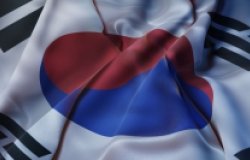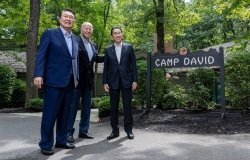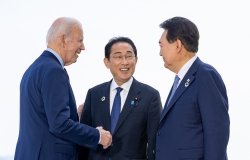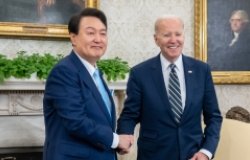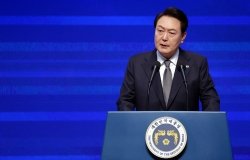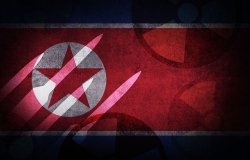Why the U.S. Should Give Pyongyang Breathing Space
North Korea's provocative behavior may be part of a larger effort to break out of diplomatic isolation and economic dependency on China by pressuring Washington to return to the negotiating table. Commentary co-authored by Jane Harman, Robert Hathaway, and James Person.
Weeks of bellicose rhetoric from North Korea has given the impression that Pyongyang is seeking military confrontation with Seoul and Washington. Today’s announcement that Pyongyang intends to restart a nuclear reactor is especially unwelcome and unhelpful. In reality, however, the North’s provocative behavior may actually be part of a larger effort to break out of diplomatic isolation and economic dependency on China by pressuring Washington to return to the negotiating table.
Two announcements in the past 36 hours seem to support this interpretation. First, a meeting of the ruling party resulted in a statement placing equal emphasis on building both a stronger economy and a nuclear deterrent. Second, the parliamentary body appointed a new premier, Pak Pong Ju, who is largely viewed as an economic reformer. Taken together, these two developments suggest that Kim Jong-un is actually more interested in improving the national economy than in turning either Los Angeles or Seoul into a “sea of flames.”
If the North’s primary goals are largely economic, then why all of the “military adventurism” of the past few months? Most likely, the North was trying (in a ham-handed and reckless way) to convince Washington that Pyongyang is too dangerous to ignore. By ratcheting up tensions, the North may have been hoping the South would push the United States to engage in dialogue with the North. Based on a 40-year-old pattern of using brinkmanship as a gateway to negotiations, the North's convoluted logic may be that this chain of events will lead to a constructive relationship with Washington that focuses on trade and aid.
There is, of course, an important domestic component to these latest developments. In particular, the announcement of an “equal emphasis policy”—which takes its name from a 1962 initiative and calls for the simultaneous development of the economy and defense capabilities—seems to be part of an increasing effort to attach Kim Jong-un to the legacy of his grandfather, the charismatic founder of the DPRK.
So what does this mean for the United States? First, continued vigilance and caution—we must not let down our guard or be provoked into making a shortsighted move. But second, and equally important, we ought to recognize that North Korea may be looking for a way to step back from its bombastic rhetoric and dangerous behavior of recent weeks. If so, we should consider giving Pyongyang the breathing space to do the right thing.
About the Authors

Jane Harman
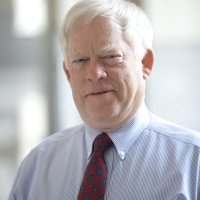
Robert Hathaway
Former Director, Asia Program, Woodrow Wilson Center; Former Public Policy Fellow, Woodrow Wilson Center

James Person
Professor of Korean Studies and Asia Programs, JHU SAIS; Senior Fellow, Foreign Policy Institute, SAIS

North Korea International Documentation Project
The North Korea International Documentation Project serves as an informational clearinghouse on North Korea for the scholarly and policymaking communities, disseminating documents on the DPRK from its former communist allies that provide valuable insight into the actions and nature of the North Korean state. It is part of the Wilson Center's History and Public Policy Program. Read more

Indo-Pacific Program
The Indo-Pacific Program promotes policy debate and intellectual discussions on US interests in the Asia-Pacific as well as political, economic, security, and social issues relating to the world’s most populous and economically dynamic region. Read more

Hyundai Motor-Korea Foundation Center for Korean History and Public Policy
The Center for Korean History and Public Policy was established in 2015 with the generous support of the Hyundai Motor Company and the Korea Foundation to provide a coherent, long-term platform for improving historical understanding of Korea and informing the public policy debate on the Korean peninsula in the United States and beyond. Read more



